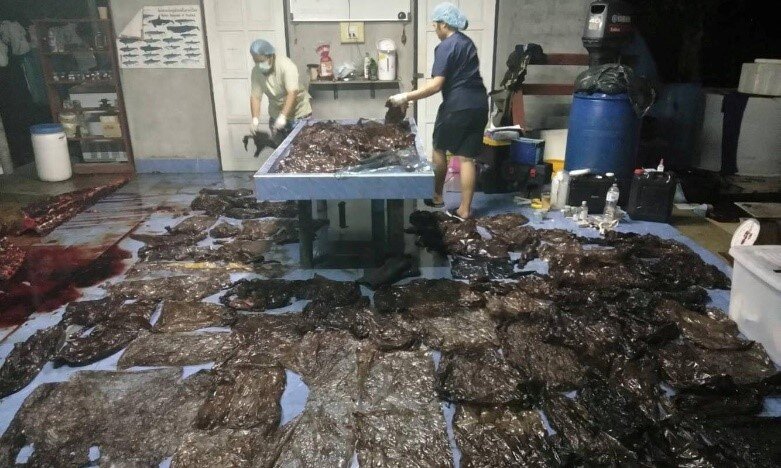War on Plastic! Tips to a lower waste lifestyle
Here’s a little insight into plastic pollution and its devastating effects on the environment and our own health. Our overconsumption and throw-away culture of plastic is the focal cause of plastic pollution. Its durability, water resistance and inexpensive qualities are what makes it so attractive to us. However, its these properties that prevent its degradation causing it to litter and pollute the earth for hundreds of years. Greenpeace states a ‘truckload of plastic enters the ocean every minute and 800,000 tonnes of plastic is produced by supermarkets every year!’ I don’t know about you, but I think that is truly shocking and diabolical.
Images are from Greenpeace (click here for source).
Our oceans are soiled with plastic (the majority being abandoned fishing equipment) which has detrimental effects on its marine life. Various animals on and offshore (including microscopic organisms and birds) are suffering from entanglement and die from consumption of marine debris, plastics and microplastics (tiny plastics particles carrying harmful toxins). A recent example saw a whale die in Thailand after ingesting 80 plastic bags (8kg of plastic). Trust me, there are plenty more horrific stories just like this one, but we’ll save that for another day.
Images are from Greenpeace (click here for source).
Have you ever stopped to think about the impact of plastic pollution on human health? Microplastics found in the sea are known to mix into the sand and are carried in the wind to which we breathe in. Microfibres shed from nylon and polyester end up in the eco system via washing machine wastewater. Humans continue to eat sea animals which have ingested plastics and repetitively consume products from plastic packaging. Plastic has reached every element of the planet making some of its forms impossible to avoid.
Images are from Greenpeace (click here for source).
Our ignorance, arrogance and greed have stripped areas of our planet of its beauty and have caused a climate emergency, but we can still reverse some of its effects. Whilst we are the problem, we are also the solution. Every one of us can make conscious decisions to reduce our plastic waste (since recycling is not the answer) to prevent destroying our planet even further. I’m in the process of transitioning to a plastic free lifestyle. Below are some tips I have discovered a long the way. I hope you find them useful!
Lower waste living tips:
Stop buying single use water bottles and coffee cups. Invest in a reusable water bottle and a travel mug! In my opinion, steel and bamboo ones are really good.
Carry your own shopping bags! Keep on reusing any plastic ones until you can no longer use them (then recycle them at supermarket points). The best investments are canvas bags.
Buy loose products where possible (e.g. fruit and veg) and store them in reusable mesh/cotton bags to prevent damage.
Reuse items as much as you can (e.g. Tupperware, storage boxes, jars etc).
Buy bamboo toothbrushes! (Make sure to snip off the bristles before throwing them into your compost bin).
Invest in a reusable cutlery set! It prevents you from using single use cutlery if you purchase food whilst out and about.
If you’re a fan of straws, buy reusable steel/bamboo ones instead of plastic/paper ones.
Switch from bottled shampoo, conditioner and shower gel to plastic free bars and/or soap! (Lush is a good place to have a browse).
Find out if there are any plastic free refill shops near to you where you can take your own containers to refill with items such as food, toiletries, cleaning products etc.
Stop using wet wipes! Switch to reusable cotton pads when taking off your makeup, washing your face etc. Use cloths instead of antibacterial wipes when cleaning.
Buy bamboo hairbrushes/combs in the future.
Substitute cling film for soya wax wraps! If that is too expensive, tin foil is still a better alternative.
If you’re looking for a new phone case, buy a biodegradable one! I recommend wildcaseuk.
Invest in reusable sanitary products (e.g. menstrual cups, reusable sanitary towels/liners).
Buy bamboo cotton ear buds!
By Deena Camps.
References:
Agence France-Presse., 2018. Whale dies from eating more than 80 plastic bags [online]. The Guardian. [Viewed 15 October 2019]. Available from: https://www.theguardian.com/environment/2018/jun/03/whale-dies-from-eating-more-than-80-plastic-bags.
Gibbens, S., 2019. You eat thousands of bits of plastic every year [online]. National Geographic. [Viewed 15 October 2019]. Available from: https://www.nationalgeographic.co.uk/environment/2019/06/you-eat-thousands-bits-plastic-every-year.
Greenpeace., 2006. Plastic Debris in the World’s Oceans [online]. Amsterdam: Greenpeace International. [Viewed 15 October 2019]. Available from: https://www.greenpeace.org/austria/Global/austria/dokumente/Studien/meere_Plastic_Debris_Study_2006.pdf
Greenpeace., 2018. Plastic pollution [online]. Greenpace. [Viewed 15 October 2019]. Available from: https://www.greenpeace.org.uk/challenges/plastic-pollution/.
Le Guern, C., 2019. When The Mermaids Cry: The Great Plastic Tide [online]. Coastal Care. [Viwed 15 October 2019]. Available from: http://plastic-pollution.org/.






